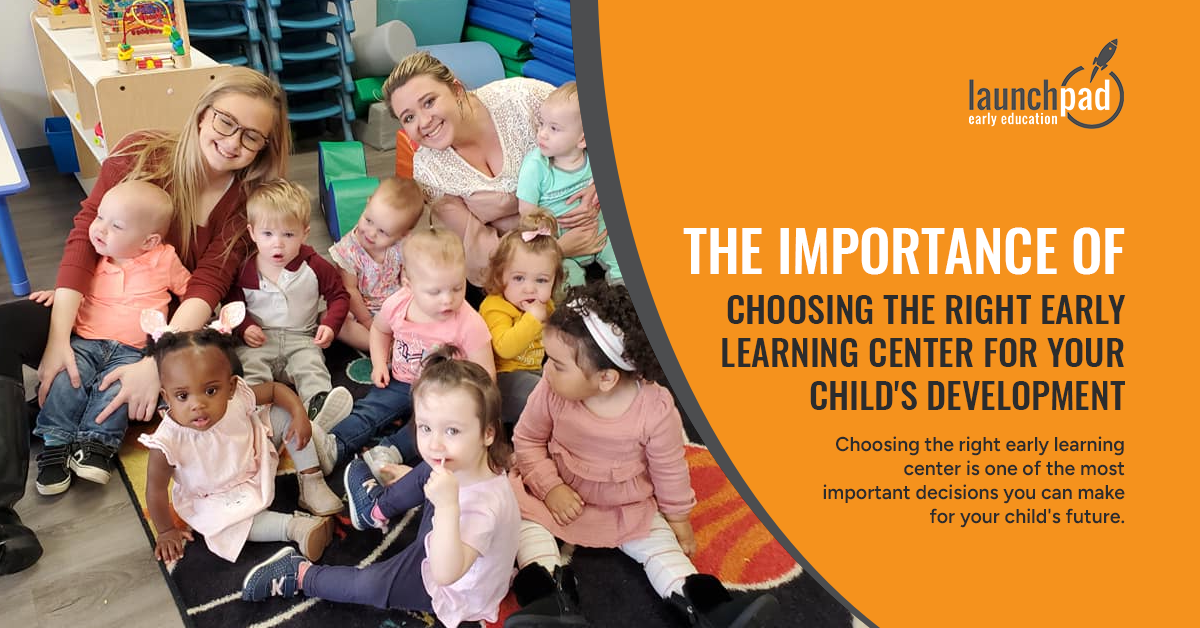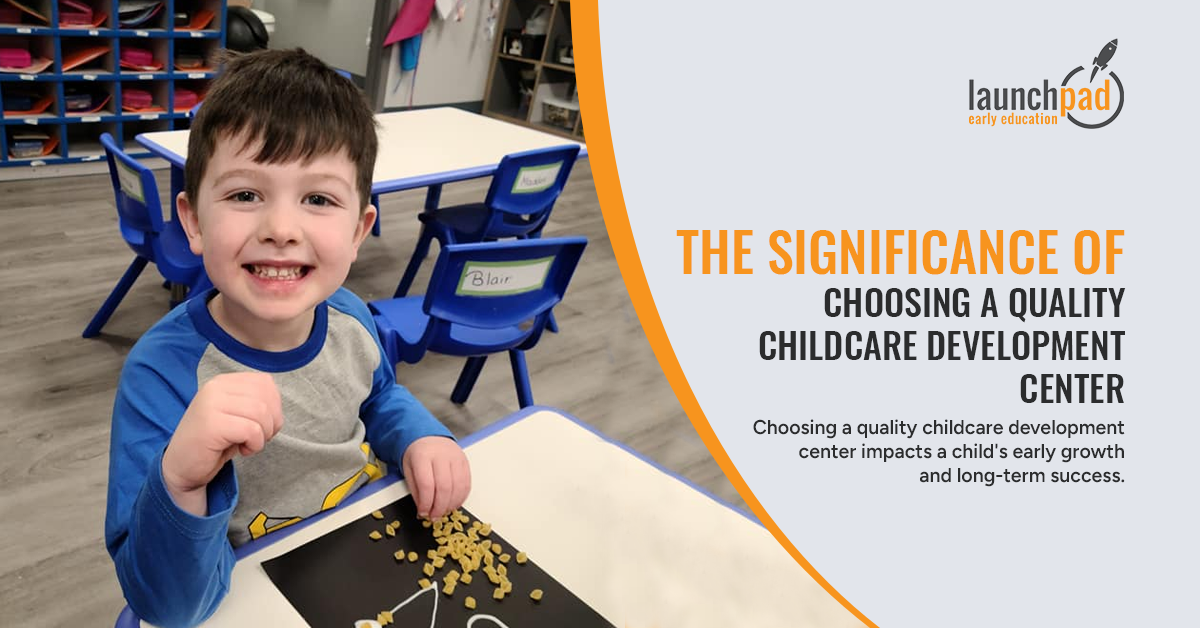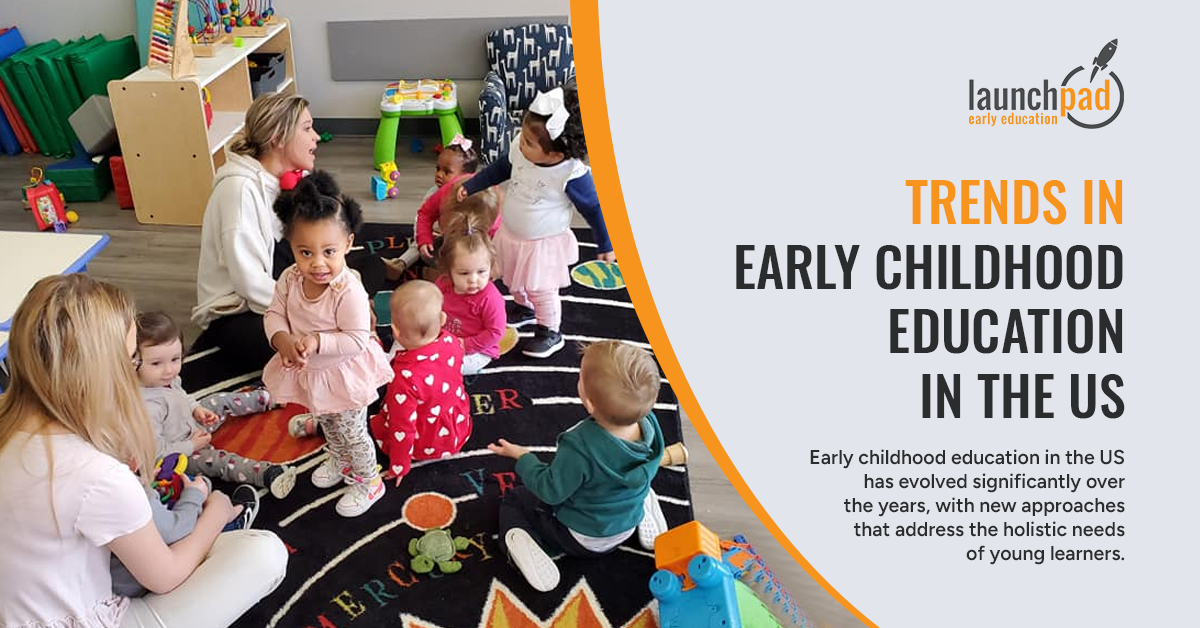Choosing the right early learning center is one of the most important decisions you can make for your child’s future. At LaunchPad Early Education, we understand that an early learning environment is more than just a place for play; it’s where foundations of faith, character, and academic growth are built.
Focusing on nurturing each child’s unique strengths and fostering a love for learning, the right center can shape your child’s development, instilling confidence, empathy, and curiosity. A quality early learning center prepares children for school by prioritizing education and family support and lays the groundwork for lifelong success.
Understanding the Role of a Child Care Center in Early Development
A child care center is more than a safe place for children; it’s a nurturing environment supporting early learning and foundational development. These centers foster cognitive, social, emotional, and physical growth, giving children the skills they need to transition into school and beyond successfully. Parents can ensure their child is supported in every aspect of their growth by choosing the right childcare center.
The Unique Value of a Child Care Center Versus Traditional Daycare
Parents often wonder what sets a childcare center apart from a traditional daycare. The answer lies in focusing on structured, developmentally appropriate activities that help children build crucial skills. Unlike standard daycare settings that may prioritize supervision alone, childcare centers strongly emphasize engaging children in ways that promote learning and curiosity.
Children benefit from a structured environment in a high-quality childcare center that fosters cognitive and social skills. Here’s how a childcare center stands out:
- Guided Learning Activities: Children participate in age-appropriate lessons and hands-on projects, helping them understand concepts like numbers, colors, and language.
- Qualified Educators: Caregivers are trained professionals skilled in early childhood education who provide care and expertise beyond primary supervision.
- Social Skill Building: Through group activities and interactions, children learn critical social skills, such as sharing, listening, and communicating with peers.
With these elements, a child care center becomes a space for children to explore and develop, giving them a strong foundation for future success.
How Child Care Centers Support Holistic Development
A quality child care center supports cognitive growth and emotional, social, and physical development. This well-rounded approach ensures that each child develops in a balanced and supportive way. Child care centers provide structured play, movement, and creativity opportunities, helping children build confidence and resilience as they learn.
Some of the ways childcare centers support holistic growth include:
- Physical Activities: Outdoor play and movement exercises help children improve coordination, balance, and motor skills, contributing to physical health.
- Emotional Guidance: Trained educators create a supportive environment, helping children build trust, express emotions, and develop self-confidence.
- Social Interaction: Children interact in group settings, allowing them to practice cooperation, empathy, and effective communication with their peers.
These aspects of holistic development equip children with well-rounded skills and create a balanced experience essential for personal growth.
Building Community and Family Connections Through a Child Care Center
Another unique benefit of a childcare center is the emphasis on family engagement and community-building. Many centers encourage family participation, fostering a sense of belonging and partnership between educators and parents. This approach helps reinforce learning at home and provides parents with unique insights into their child’s progress.
Child care centers support family connections through activities like:
- Parent-Teacher Conferences: Regular updates ensure parents stay informed about their child’s development and any areas for growth.
- Family Workshops: Educational sessions for families that offer tips and resources on supporting learning at home.
- Community Events: Fun, inclusive activities where families can meet and connect, building a support network beyond the classroom.
This sense of community strengthens the child’s learning experience, creating a supportive, engaging environment for the child and their family.
The Significance of Choosing a Quality Childcare Development Center
Choosing a quality childcare development center impacts a child’s early growth and long-term success. With the right environment, children can develop critical cognitive, emotional, and social abilities in a nurturing space. High-quality centers go beyond primary care, focusing on building a pillar for lifelong learning and well-being.
Supporting Cognitive Growth and Early Learning Foundations
A quality childcare development center creates a learning-rich environment that helps children build essential skills for school readiness. With structured activities and an engaging curriculum, children are introduced to early literacy, numeracy, and problem-solving skills in a fun and age-appropriate way. These centers also foster a love for learning, setting the stage for future academic success.
In a well-rounded childcare development center, cognitive growth is supported through:
- Engaging Learning Activities: Children are exposed to hands-on projects and interactive lessons that make learning enjoyable and memorable.
- Age-Appropriate Curriculum: Centers use structured programs that match each developmental stage, helping children progress comfortably.
- Encouragement of Curiosity: Teachers foster a love for learning by allowing children to explore, ask questions, and think critically.
These elements support children in their early education and instill a sense of curiosity and excitement about learning that benefits them throughout life.
Nurturing Emotional and Social Skills
A high-quality childcare development center nurtures emotional intelligence and social skills, which are essential for building confidence and resilience. Through positive interactions with caregivers and peers, children learn to manage emotions, communicate effectively, and cooperate with others. This creates a balanced foundation to serve them well as they encounter new social environments.
Key ways that emotional and social development is encouraged include:
- Role-Modeling Positive Behavior: Educators demonstrate empathy, patience, and kindness, helping children learn to do the same.
- Conflict Resolution: Children are taught constructive ways to handle disagreements, preparing them for teamwork and social situations.
- Collaborative Play: Group activities foster cooperation and listening skills, allowing children to develop friendships and feel part of a community.
Through these experiences, children build strong emotional foundations that help them navigate school and social life confidently and empathetically.
Promoting Physical Development and Healthy Habits
Physical development, along with intellectual and social growth, is a crucial part of a child’s early education. Quality childcare centers offer plenty of opportunities for physical activities that build motor skills, coordination, and healthy habits. From playground time to movement-based games, these activities keep children active, contributing to their physical health and cognitive growth.
Some key ways physical development is promoted include:
- Outdoor Play: Centers often have safe outdoor areas where children can run, jump, and explore, improving their coordination and fitness.
- Structured Movement Activities: Guided exercises and games help children develop balance and fine motor skills.
- Healthy Snack and Meal Options: Many centers provide nutritious meals, teaching children the importance of good nutrition and fueling their active lifestyles.
These experiences support physical growth and teach children the value of staying active and eating well, habits they can carry into adulthood.
Building Family and Community Connections
One of the hallmarks of a quality childcare development center is its commitment to partnering with families and creating a strong sense of community. Through open communication and family engagement, these centers provide a support network for children and parents, creating a cohesive experience reinforcing learning at home.
Quality childcare centers often promote family connections by offering:
- Parent Involvement Programs: Opportunities for parents to participate in classroom activities, helping them stay engaged in their child’s growth.
- Regular Progress Reports: Frequent updates on a child’s development, fostering transparency and collaboration.
- Family Events: Centers often host events that bring families together, building connections within the community and fostering a supportive environment.
This collaboration between families and the childcare center creates a unified approach to early childhood development, helping children thrive in and out of the classroom.
Trends in Early Childhood Education in the US
Early childhood education in the US has evolved significantly over the years, with new approaches that address the holistic needs of young learners. Today’s trends reflect a deeper understanding of how young children learn best and prioritize academic readiness and emotional, social, and physical development.
Focus on Social-Emotional Learning (SEL)
One of the most impactful trends in early childhood education is the emphasis on social-emotional learning (SEL). Educators recognize that helping children understand and manage their emotions is essential for their development and future success. SEL initiatives teach children empathy, resilience, and conflict resolution skills, building a solid emotional foundation that aids in school and life.
SEL is often integrated into classroom activities through:
- Emotional Identification Exercises: Activities that help children recognize and name their feelings, teaching them to process emotions constructively.
- Mindfulness Practices: Simple breathing exercises and quiet time to encourage self-awareness and emotional regulation.
- Role-Playing Scenarios: Opportunities to act out social situations, helping children learn to communicate, cooperate, and resolve conflicts effectively.
With SEL programs, early childhood education goes beyond academic preparation, ensuring children have the emotional skills for lifelong resilience and healthy relationships.
STEM Integration in Early Learning
As STEM (Science, Technology, Engineering, and Math) careers grow, introducing these concepts early has become a priority in early childhood education. Through STEM activities, children learn to think critically, solve problems, and understand how things work. STEM-focused education sparks curiosity and a love for discovery, setting the stage for future academic interest.
STEM concepts are introduced through hands-on, age-appropriate activities like:
- Simple Science Experiments: Children explore cause and effect through fun activities, like observing water density or plant growth.
- Building and Engineering Projects: Using blocks, magnets, and other materials to encourage spatial awareness and problem-solving.
- Math Games: Fun counting, sorting, and pattern-recognition games to build a foundation in numeracy.
These engaging, hands-on experiences make STEM accessible to young learners, promoting curiosity and encouraging analytical thinking skills that support academic readiness.
Emphasis on Inclusivity and Cultural Awareness
Understanding different cultures and backgrounds is crucial in today’s diverse society. Many early childhood education programs are committed to inclusivity and cultural awareness, creating welcoming environments where every child feels valued and understood. By celebrating diverse backgrounds, children learn acceptance, respect, and open-mindedness.
Inclusivity is integrated into the classroom through:
- Multicultural Activities: Celebrating various holidays, traditions, and foods that allow children to experience different cultures.
- Diverse Reading Materials: Books and stories featuring characters from various backgrounds help children see themselves and others in the material.
- Language Exposure: Centers may introduce words and phrases from different languages, enhancing children’s understanding of the world.
By focusing on cultural awareness, early childhood education prepares children to thrive in a multicultural world, teaching them the importance of inclusion and respect for others.
Conclusion
Choosing the right early learning center can make a difference in your child’s life. From building foundational academic skills to nurturing emotional and social growth, a quality childcare center sets the stage for lifelong success. With innovative trends like STEM learning, social-emotional focus, and nature-based activities, today’s early education programs empower children to explore, learn, and thrive in a supportive environment that respects their individuality and prepares them for the future.
If you’re ready to give your child the best possible start, LaunchPad Early Education is here to partner with you. Visit our website or call us at (615) 809-2211 to learn more about how we’re building brighter futures every day. Let’s set your child on a path to discovery and success together!




